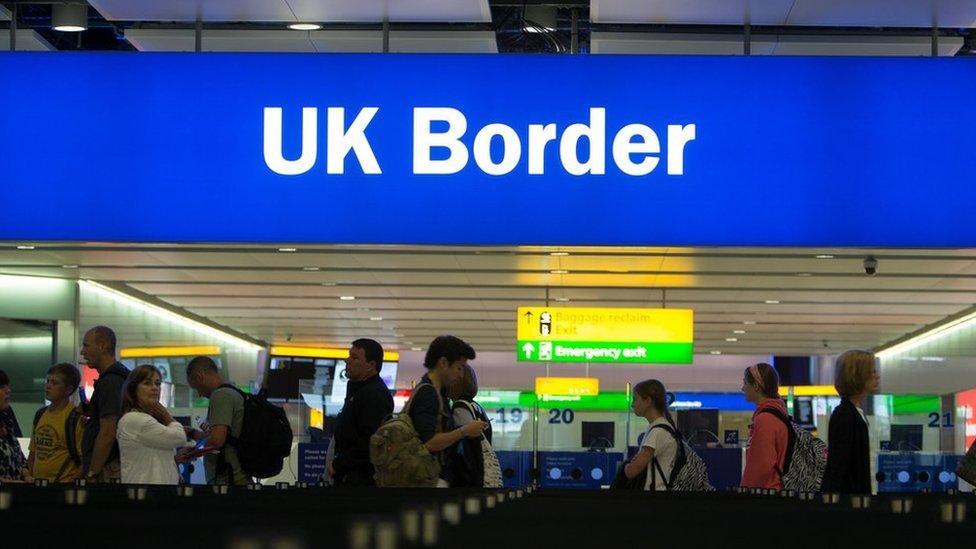Conservative manifesto: No timetable for migration pledge
- Published

The Conservatives would "aim" to meet their manifesto pledge to reduce net migration to the tens of thousands, a cabinet minister has said.
Sir Michael Fallon said the policy was not yet costed as the government did not know when it would be achieved.
The Tories have also promised to overhaul social care funding in a manifesto, external Theresa May said would "deliver for mainstream Britain".
But Labour said it was an "all-out attack on pensioner incomes".
And Lib Dem leader Tim Farron said that while he backed the means-testing of winter fuel allowances for pensioners, other Tory policies such as ending free school lunches for infants were "cruel and heartless".
The pledge to reduce migration to below 100,000 - which was in the 2010 and 2015 Tory manifestos - has never been met.
The most recent figure was 273,000 and the last year that it was below 100,000 was 1997.
The manifesto for the 8 June election says: "Theresa May's Conservatives will deliver... controlled, sustainable migration, with net migration down to the tens of thousands".
'Our ambition'
Sir Michael, the defence secretary, was asked on the BBC's Newsnight to confirm that meeting the pledge was now the party's policy.
"It's our ambition to get it down," he said, adding: "It's our aim to continue to bear down on immigration."
Sir Michael said it would become easier to reduce migration as the UK leaves the EU, and pointed to another manifesto pledge, to increase the levy on firms hiring foreign workers.
He said there would be a cost to the economy, but this had not yet been calculated "because we do not know specifically what year we are going to reach that point" of hitting the target.
Laura Kuenssberg breaks down the 88-page Tory manifesto into three things you need to know
Other manifesto measures include:
Balancing the budget by 2025
Increasing the national living wage to 60% of median earnings by 2020
A pledge that a referendum on Scottish independence cannot take place until the Brexit process is completed
Scrapping winter fuel payments to better-off pensioners - at the moment, all pensioners qualify for one-off payments of between £100 and £300 each winter
A reduction of the so-called "triple lock" on pensions to a "double lock" with the state pension to rise by the higher of average earnings or inflation - but to no longer go up by 2.5% if they are both lower than that
An extra £4bn for schools in England by 2022 - partly funded by an end to the current provision of free school lunches for all infant pupils in England
Scrapping the ban on setting up new grammar schools
Universities charging maximum tuition fees will have to sponsor academies or help found free schools
A free vote in the Commons to be held on repealing the ban on fox hunting
Launching the manifesto in Halifax on Thursday, Mrs May said: "We must take this opportunity to build a great meritocracy in Britain. It means making Britain a country that works, not for the privileged few, but for everyone."
The social care changes proposed are that the value of someone's property would be included in the means test for receiving free care in their own home - currently only their income and savings are taken into account.
People will be able to defer paying for their care until after their death. Those in residential care - whose property is already taken into account in the means test - can already do this.
There will also be an increase in the amount of wealth someone can have - savings and the value of their home - from the current £23,250 to £100,000 - before they lose the right to free care.
That means that however much is spent on social care, it becomes free once someone is down to their last £100,000.
'New burdens'
Former government adviser Sir Andrew Dilnot, who produced a report on the social care system for the coalition government in 2011 calling for a cap on care costs, criticised the measures, saying people would be left "helpless" until their last £100,000.
Labour said the policy - which will mean many people having to pay more for their care at home - coupled with the end of the triple lock and the winter fuel changes, represented "pensioner penalties", with "three major new burdens" placed on older people.
Mr Farron told BBC Breakfast the introduction of what he described as a "dementia tax" was one of a number of "horrifying" policies in the manifesto.
The Conservatives were not listening to the public, he suggested, because they "expect a landslide victory" on 8 June.
But speaking on Question Time, International Development Secretary Priti Patel said the social care reforms were a "long-term decision" to address funding shortages, adding that they would ensure people did not have to sell their houses in their lifetime.
In Scotland the SNP government has maintained a policy of free personal care.

